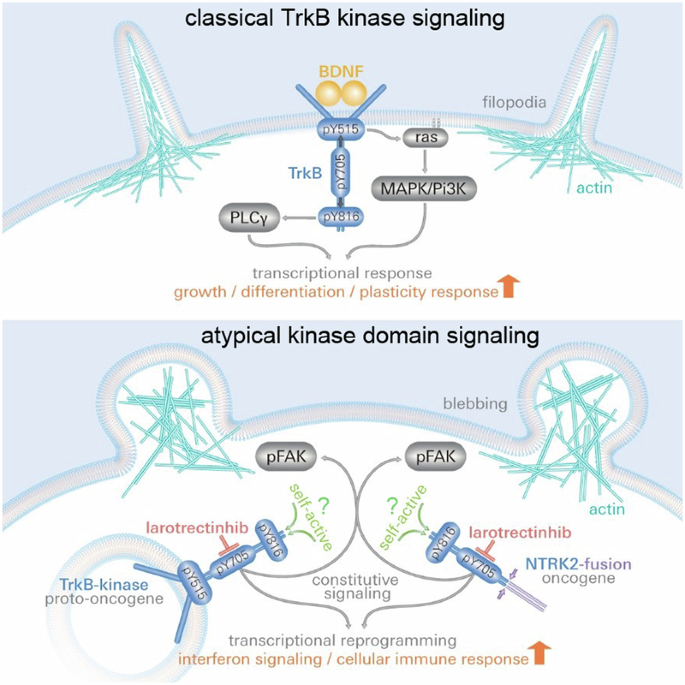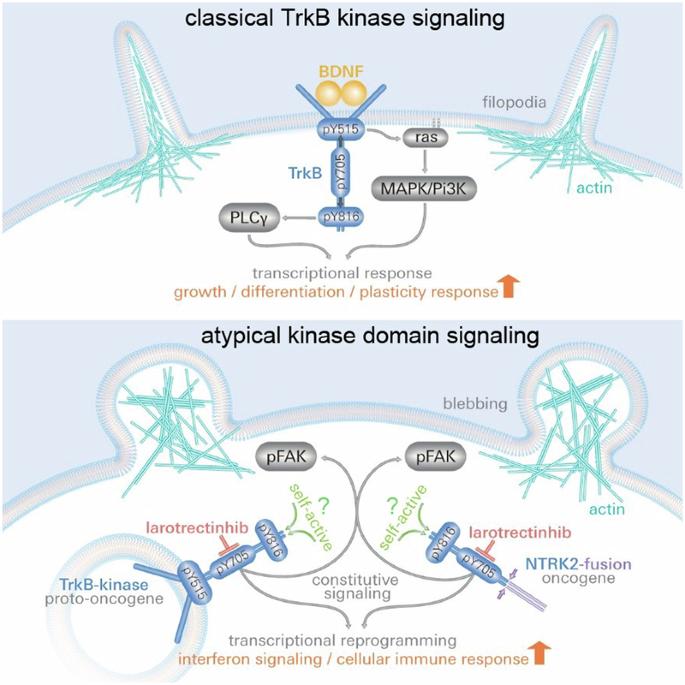Atypical cellular responses mediated by intracellular constitutive active TrkB (NTRK2) kinase domains and a solely intracellular NTRK2-fusion oncogene
IF 5
3区 医学
Q1 BIOTECHNOLOGY & APPLIED MICROBIOLOGY
引用次数: 0
Abstract
Trk (NTRK) receptor and NTRK gene fusions are oncogenic drivers of a wide variety of tumors. Although Trk receptors are typically activated at the cell surface, signaling of constitutive active Trk and diverse intracellular NTRK fusion oncogenes is barely investigated. Here, we show that a high intracellular abundance is sufficient for neurotrophin-independent, constitutive activation of TrkB kinase domains. In HEK293 cells, constitutive active TrkB kinase and an intracellular NTRK2-fusion oncogene (SQSTM1-NTRK2) reduced actin filopodia dynamics, phosphorylated FAK, and altered the cell morphology. Atypical cellular responses could be mimicked with the intracellular kinase domain, which did not activate the Trk-associated MAPK/ERK pathway. In glioblastoma-like U87MG cells, expression of TrkB or SQSTM1-NTRK2 reduced cell motility and caused drastic changes in the transcriptome. Clinically approved Trk inhibitors or mutating Y705 in the kinase domain, blocked the cellular effects and transcriptome changes. Atypical signaling was also seen for TrkA and TrkC. Moreover, hallmarks of atypical pTrk kinase were found in biopsies of Nestin-positive glioblastoma. Therefore, we suggest Western blot-like immunoassay screening of NTRK-related (brain) tumor biopsies to identify patients with atypical panTrk or phosphoTrk signals. Such patients could be candidates for treatment with NTRK inhibitors such as Larotrectinhib or Entrectinhib.


由细胞内组成型活性TrkB(NTRK2)激酶结构域和单纯细胞内NTRK2融合型癌基因介导的非典型细胞反应
Trk(NTRK)受体和 NTRK 基因融合是多种肿瘤的致癌因素。尽管Trk受体通常在细胞表面被激活,但对组成型活性Trk和多种细胞内NTRK融合致癌基因的信号转导几乎没有研究。在这里,我们发现细胞内的高丰度足以使不依赖于神经营养素的 TrkB 激酶域构成性激活。在 HEK293 细胞中,组成型活性 TrkB 激酶和细胞内 NTRK2 融合癌基因(SQSTM1-NTRK2)降低了肌动蛋白丝状体动力学、磷酸化了 FAK 并改变了细胞形态。细胞内激酶结构域可模拟非典型细胞反应,但不会激活与 Trk 相关的 MAPK/ERK 通路。在胶质母细胞瘤样 U87MG 细胞中,TrkB 或 SQSTM1-NTRK2 的表达会降低细胞的运动能力,并导致转录组发生剧烈变化。临床批准的 Trk 抑制剂或突变激酶结构域中的 Y705 可阻断细胞效应和转录组变化。TrkA和TrkC也出现了非典型信号传导。此外,在 Nestin 阳性胶质母细胞瘤的活检组织中也发现了非典型 pTrk 激酶的特征。因此,我们建议对与 NTRK 相关的(脑)肿瘤活检组织进行类似 Western 印迹的免疫测定筛查,以确定存在非典型 panTrk 或 phosphoTrk 信号的患者。这类患者可能是接受 NTRK 抑制剂(如 Larotrectinhib 或 Entrectinhib)治疗的候选者。
本文章由计算机程序翻译,如有差异,请以英文原文为准。
求助全文
约1分钟内获得全文
求助全文
来源期刊

Cancer gene therapy
医学-生物工程与应用微生物
CiteScore
10.20
自引率
0.00%
发文量
150
审稿时长
4-8 weeks
期刊介绍:
Cancer Gene Therapy is the essential gene and cellular therapy resource for cancer researchers and clinicians, keeping readers up to date with the latest developments in gene and cellular therapies for cancer. The journal publishes original laboratory and clinical research papers, case reports and review articles. Publication topics include RNAi approaches, drug resistance, hematopoietic progenitor cell gene transfer, cancer stem cells, cellular therapies, homologous recombination, ribozyme technology, antisense technology, tumor immunotherapy and tumor suppressors, translational research, cancer therapy, gene delivery systems (viral and non-viral), anti-gene therapy (antisense, siRNA & ribozymes), apoptosis; mechanisms and therapies, vaccine development, immunology and immunotherapy, DNA synthesis and repair.
Cancer Gene Therapy publishes the results of laboratory investigations, preclinical studies, and clinical trials in the field of gene transfer/gene therapy and cellular therapies as applied to cancer research. Types of articles published include original research articles; case reports; brief communications; review articles in the main fields of drug resistance/sensitivity, gene therapy, cellular therapy, tumor suppressor and anti-oncogene therapy, cytokine/tumor immunotherapy, etc.; industry perspectives; and letters to the editor.
 求助内容:
求助内容: 应助结果提醒方式:
应助结果提醒方式:


